
Related
Guests
- Edward SnowdenNSA whistleblower, interviewed by The Guardian’s Glenn Greenwald in Hong Kong. The video was shot by Laura Poitras.
Former CIA employee Edward Snowden has come forward as the whistleblower behind the explosive revelations about the National Security Agency and the U.S. surveillance state. Three weeks ago the 29-year-old left his job inside the NSA’s office in Hawaii where he worked for the private intelligence firm Booz Allen Hamilton. Today he is in Hong Kong — not sure if he will ever see his home again. In a video interview with The Guardian of London, Snowden says he exposed top-secret NSA surveillance programs to alert Americans of expansive government spying on innocents. “Even if you’re not doing anything wrong, you’re being watched and recorded,” Snowden says. “And the storage capability of these systems increases every year, consistently, by orders of magnitude, to where it’s getting to the point you don’t have to have done anything wrong, you simply have to eventually fall under suspicion from somebody, even by a wrong call, and then they can use this system to go back in time and scrutinize every decision you’ve ever made, every friend you’ve ever discussed something with, and attack you on that basis, to sort of derive suspicion from an innocent life and paint anyone in the context of a wrongdoer. … The public needs to decide whether these programs and policies are right or wrong.”
Transcript
AMY GOODMAN: We turn now to the man who blew the whistle on the National Security Agency and the expanding U.S. surveillance state. On Sunday, The Guardian newspaper revealed the source of its explosive series on the NSA to be a 29-year-old former CIA technical assistant named Edward Snowden. For the past four years, Snowden has been working at the NSA as an employee of various outside contractors, including Booz Allen Hamilton and Dell. Most recently, he was working at the NSA office in Hawaii. On May 20th, he boarded a plane bound for Hong Kong, where he has remained ever since.
Since Wednesday, The Guardian has published a series of articles based on information provided by Snowden. First The Guardian revealed the National Security Agency is collecting telephone records of millions of Verizon customers under a secret court order issued in April. Then The Guardian revealed the existence of a top-secret program codenamed PRISM, where the NSA obtained access to the central servers of nine major Internet companies, including Google, Microsoft, Apple, Yahoo! and Facebook. Then, on Friday, The Guardian exposed how President had ordered his senior national security and intelligence officials to draw up a list of potential overseas targets for U.S. cyber-attacks.
And then The Guardian revealed details about an NSA data-mining tool called Boundless Informant that details and even maps by country the voluminous amount of information it collects from computer and telephone networks. A top-secret NSA “global heat map” shows that in March 2013 the agency collected 97 billion pieces of intelligence from computer networks worldwide. The NSA most frequently targeted Iran, Pakistan, Jordan, Egypt and India. The Boundless Informant documents also showed the agency collected almost three billion pieces of intelligence from U.S. computer networks over a 30-day period ending in March of 2013.
In a few minutes, we’ll be joined by Guardian columnist Glenn Greenwald, who has written these exposés, but first let’s turn to NSA whistleblower Edward Snowden in his own words. He recently sat down with Glenn Greenwald to talk about why he leaked the documents and why he is revealing his identity. The interview was filmed by Laura Poitras. It was filmed in Hong Kong. It was posted on the Guardian website on Sunday.
EDWARD SNOWDEN: My name’s Ed Snowden. I am 29 years old. I work for Booz Allen Hamilton as an infrastructure analyst for NSA in Hawaii.
GLENN GREENWALD: What are some of the positions that you held previously within the intelligence community?
EDWARD SNOWDEN: I have been a systems engineer, systems administrator, a senior adviser for the Central Intelligence Agency, a solutions consultant and a telecommunications information systems officer.
GLENN GREENWALD: One of the things people are going to be most interested in, in trying to understand what—who you are and what you’re thinking, is there came some point in time when you crossed this line of thinking about being a whistleblower to making the choice to actually become a whistleblower. Walk people through that decision-making process.
EDWARD SNOWDEN: When your in positions of privileged access, like a systems administrator for these sort of the intelligence community agencies, you’re exposed to a lot more information on a broader scale than the average employee, and because of that, you see things that may be disturbing. But over the course of a normal person’s career, you’d only see one or two of these instances. When you see everything, you see them on a more frequent basis, and you recognize that some of these things are actually abuses. And when you talk to people about them in a place like this, where this is the normal state of business, people tend not to take them very seriously and, you know, move on from them. But over time that awareness of wrongdoing sort of builds up, and you feel compelled to talk about it. And the more you talk about it, the more you’re ignored, the more you’re told it’s not a problem, until eventually you realize that these things need to be determined by the public, not by somebody who was simply hired by the government.
GLENN GREENWALD: Talk a little bit about how the American surveillance state actually functions. Does it target the actions of Americans?
EDWARD SNOWDEN: NSA and the intelligence community, in general, is focused on getting intelligence wherever it can, by any means possible, that it believes, on the grounds of sort of a self-certification, that they serve the national interest. Originally, we saw that focus very narrowly tailored as foreign intelligence gathered overseas. Now, increasingly, we see that it’s happening domestically. And to do that, they—the NSA specifically targets the communications of everyone. It ingests them by default. It collects them in its system, and it filters them, and it analyzes them, and it measures them, and it stores them for periods of time, simply because that’s the easiest, most efficient and most valuable way to achieve these ends. So while they may be intending to target someone associated with a foreign government or someone that they suspect of terrorism, they’re collecting your communications to do so. Any analyst at any time can target anyone, any selector anywhere. Where those communications will be picked up depends on the range of the sensor networks and the authorities that that analyst is empowered with. Not all analysts have the ability to target everything. But I, sitting at my desk, certainly had the authorities to wiretap anyone, from you or your accountant to a federal judge, to even the president, if I had a personal email.
GLENN GREENWALD: One of the extraordinary parts about this episode is that usually whistleblowers do what they do anonymously and take steps to remain anonymous for as long as they can, which they hope, often, is forever. You, on the other hand, have this attitude of the opposite, which is to declare yourself openly as the person behind these disclosures. Why did you choose to do that?
EDWARD SNOWDEN: I think that the public is owed an explanation of the motivations behind the people who make these disclosures that are outside of the democratic model. When you are subverting the power of government, that that’s a fundamentally dangerous thing to democracy. And if you do that in secret consistently, you know, as the government does when it wants to benefit from a secret action that it took, it will kind of get its officials a mandate to go, “Hey, you know, tell the press about this thing and that thing, so the public is on our side.” But they rarely, if ever, do that when an abuse occurs. That falls to individual citizens. But they’re typically maligned. You know, it becomes a thing of these people are against the country, they’re against the government. But I’m not. I’m no different from anybody else. I don’t have special skills. I’m just another guy who sits there, day to day, in the office, watches what happening—what’s happening, and goes, “This is something that’s not our place to decide. The public needs to decide whether these programs and policies are right or wrong.” And I’m willing to go on the record to defend the authenticity of them and say, “I didn’t change these. I didn’t modify the story. This is the truth. This is what’s happening. You should decide whether we need to be doing this.”
GLENN GREENWALD: Have you given thought to what it is that the U.S. government’s response to your conduct is in terms of what they might say about you, how they might try to depict to, what they might try to do to you?
EDWARD SNOWDEN: Yeah, I could be, you know, rendered by the CIA. I could have people come after me or any of their third-party partners. You know, they work closely with a number of other nations. Or, you know, they could pay off the triads or, you know, any—any of their agents or assets. We’ve got a CIA station just up the road in the consulate here in Hong Kong, and I’m sure they’re going to be very busy for the next week. And that’s a fear I’ll live under for the rest of my life, however long that happens to be. You can’t come forward against the world’s most powerful intelligence agencies and be completely free from risk, because they’re such powerful adversaries that no one can meaningfully oppose them. If they want to get you, they’ll get you, in time.
But at the same time, you have to make a determination about what it is that’s important to you. And if living—living unfreely but comfortably is something you’re willing to accept—and I think many of us are; it’s the human nature—you can get up every day, you can go to work, you can collect your large paycheck for relatively little work against the public interest and go to sleep at night after watching your shows. But if you realize that that’s the world that you helped create and it’s going to get worse with the next generation and the next generation, who extend the capabilities of this sort of architecture of oppression, you realize that you might be willing to accept any risk, and it doesn’t matter what the outcome is, so long as the public gets to make their own decisions about how that’s applied.
GLENN GREENWALD: Why should people care about surveillance?
EDWARD SNOWDEN: Because even if you’re not doing anything wrong, you’re being watched and recorded. And the storage capability of these systems increases every year consistently, by orders of magnitude, to where it’s getting to the point you don’t have to have done anything wrong. You simply have to eventually fall under suspicion from somebody, even by a wrong call, and then they can use the system to go back in time and scrutinize every decision you’ve ever made, every friend you’ve ever discussed something with, and attack you on that basis, to sort of derive suspicion from an innocent life and paint anyone in the context of a wrongdoer.
GLENN GREENWALD: We are currently sitting in a room in Hong Kong, which is where we are because you travel here. Talk a little bit about why it is that you came here. And specifically, there are going to be people who will speculate that what you really intend to do is to defect to the country that many see as the number one rival of the United States, which is China, and that what you’re really doing is essentially seeking to aid an enemy of the United States with which you intend to seek asylum. Can you talk a little bit about that?
EDWARD SNOWDEN: Sure. So there’s a couple assertions in those arguments that are sort of embedded in the questioning of the choice of Hong Kong. The first is that China is an enemy of the United States. It’s not. I mean, there are conflicts between the United States government and the Chinese PRC government. But the peoples, inherently, you know, we don’t care. We trade with each other freely. You know, we’re not at war. We’re not, you know, armed conflict, and we’re not trying to be. We’re the largest trading partners out there for each other.
Additionally, Hong Kong has a strong tradition of free speech. People think, “Oh, China, great firewall.” Mainland China does have significant restrictions on free speech, but the Hong Kong—the people of Hong Kong have a long tradition of protesting in the streets, of making their views known. The Internet is not filtered here, no more so than any other Western government. And I believe that the Hong Kong government is actually independent in relation to a lot of other leading Western governments.
GLENN GREENWALD: If your motive had been to harm the United States and help its enemies, or if your motive had been personal material gain, were there things that you could have done with these documents to advance those goals that you didn’t end up doing?
EDWARD SNOWDEN: Absolutely. I mean, anybody in the positions of access with the technical capabilities that I had could, you know, suck out secrets, pass them on the open market to Russia. You know, they always have an open door, as we do. I had access to, you know, the full rosters of everyone working at the NSA, the entire intelligence community, and undercover assets all around the world, the locations of every station we have, what their missions are and so forth. If I had just wanted to harm the U.S., you know, that—you could shut down the surveillance system in an afternoon. But that’s not my intention. And I think, for anyone making that argument, they need to think, if they were in my position, and, you know, you live a privileged life—you’re living in Hawaii, in Paradise, and making a ton of money—what would it take to make you leave everything behind?
The greatest fear that I have regarding the outcome for America of these disclosures is that nothing will change. People will see in the media all of these disclosures. They’ll know the length that the government is going to grant themselves powers, unilaterally, to create greater control over American society and global society, but they won’t be willing to take the risks necessary to stand up and fight to change things, to force their representatives to actually take a stand in their interests. And the months ahead, the years ahead, it’s only going to get worse, until eventually there will be a time where policies will change, because the only thing that restricts the activities of the surveillance state are policy. Even our agreements with other sovereign governments, we consider that to be a stipulation of policy rather than a stipulation of law. And because of that, a new leader will be elected, they’ll flip the switch, say that because of the crisis, because of the dangers that we face in the world, you know, some new and unpredicted threat, we need more authority, we need more power, and there will be nothing the people can do at that point to oppose it, and it’ll be turnkey tyranny.
AMY GOODMAN: NSA whistleblower Ed Snowden being interviewed by The Guardian's Glenn Greenwald. The interview was filmed by award-winning documentary filmmaker Laura Poitras in Snowden's Hong Kong hotel room on June 6. Edward Snowden left the U.S. for Hong Kong on May 20th, has been there since. When we come back, we’ll be joined by Glenn Greenwald from Hond Kong and then NSA whistleblower William Binney. Stay with us.

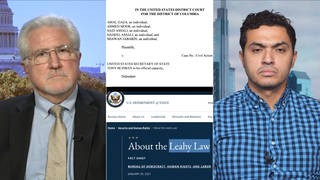

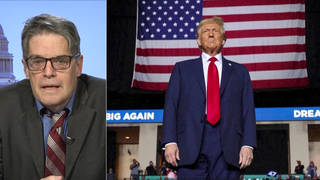
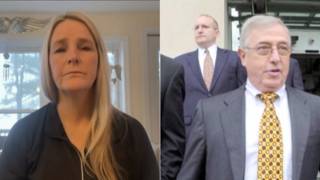





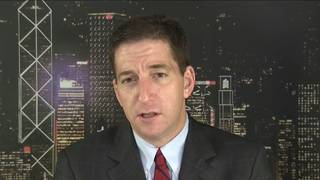
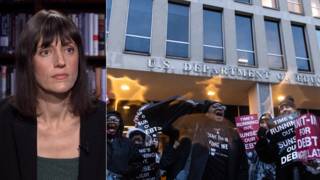
Media Options